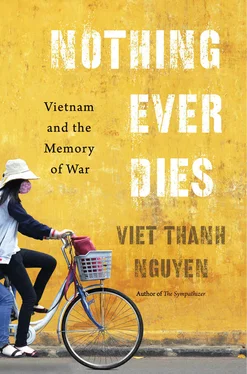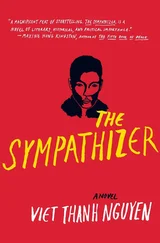Viet Thanh Nguyen
Nothing Ever Dies: Vietnam and the Memory of War
Denver picked at her fingernails. “If it’s still there, waiting, that must mean nothing ever dies.”
Sethe looked right in Denver’s face. “Nothing ever does,” she said.
TONI MORRISON, Beloved
I WAS BORN IN VIETNAM but made in America. I count myself among those Vietnamese dismayed by America’s deeds but tempted to believe in its words. I also count myself among those Americans who often do not know what to make of Vietnam and want to know what to make of it. Americans, as well as many people the world over, tend to mistake Vietnam with the war named in its honor, or dishonor as the case may be. This confusion has no doubt led to some of my own uncertainty about what it means to be a man with two countries, as well as the inheritor of two revolutions.
I have spent much of my life sorting through this confusion, both my own and that of the world, and the most succinct explanation that I have found about the meaning of the war, at least for Americans, comes from Martin Luther King Jr. “If America’s soul becomes totally poisoned,” he said, “part of the autopsy must read ‘Vietnam.’ ” 1Americans mostly know King for his dream, but this is his prophecy, and it continues in this manner: “The war in Vietnam is but a symptom of a far deeper malady within the American spirit. If we ignore this sobering reality, we will find ourselves organizing ‘clergy and laymen concerned’ committees for the next generation. They will be concerned about Guatemala and Peru. They will be concerned about Thailand and Cambodia. They will be concerned about Mozambique and South Africa. We will be marching for these and a dozen other names and attending rallies without end, unless there is a significant and profound change in American life.” 2Exactly one year after uttering these words, he was assassinated.
He did not mention Iraq and Afghanistan, but since his speech, many Americans have raised the relationship between the conflicts there and the war in Vietnam. 3Even though Vietnam is neither Iraq nor Afghanistan, the analogy keeps returning for Americans. This invocation of Vietnam as quagmire, syndrome, and war speaks neither to Vietnamese reality nor to current difficulties in Iraq and Afghanistan. It speaks to American fear. Americans think defeat in these wars is the worst thing, when winning in Iraq and Afghanistan today only means more of the same tomorrow: Somalia, Pakistan, Yemen, and so on. This is the most important reason for Americans to remember what they call the Vietnam War, the fact that it was one conflict in a long line of horrific wars that came before it and after it. This war’s identity — and, indeed, any war’s identity — cannot be extricated from the identity of war itself.
For King, “the problem of racism, the problem of economic exploitation, and the problem of war are all tied together.” 4His prophecy does not always roll off the tongue. The language is only occasionally biblical, never uplifting. He asks us not to turn our eyes up to the mountaintop but down to the plain, the factory, the field, the ghetto, the unemployment line, the draft board, the rice paddy, the lotus blossoming in a pond of mud, the Vietnamese landscape that even American soldiers called beautiful, and America, what the Vietnamese call the beautiful country. These are the places where memories of war belong. Most troublesome is the memory of how it was a war that took place not only over there but also over here, because a war is not just about the shooting but about the people who make the bullets and deliver the bullets and, perhaps most importantly, pay for the bullets, the distracted citizenry complicit in what King calls the “brutal solidarity” of white brother and black. 5
Although King refers to America, he may as well be gesturing to Vietnam, both revolutionary countries which have not lived up to their revolutions. While the America that was a city upon a hill now exists mostly as a sentimental fantasy, even wartime Vietnam seems far away. This was the country of which the revolutionary Che Guevara could say, “How close and bright would the future appear if two, three, many Vietnams flowered on the face of the globe.” 6He was speaking of the way that the Vietnamese war against American occupation had inspired hope among those who dreamed of liberation and independence in the Americas, Africa, and Asia. Today the Vietnamese and American revolutions manufacture memories only to absolve the hardening of their arteries. For those of us who consider ourselves to be inheritors of one or both of these revolutions, or who have been influenced by them in some way, we have to know how we make memories and how we forget them so that we can beat their hearts back to life. That is the project, or at least the hope, of this book.
THIS IS A BOOK on war, memory, and identity. It proceeds from the idea that all wars are fought twice, the first time on the battlefield, the second time in memory. Any war could prove this claim, but the one that serves personally as a metonym for the problem of war and memory is what some call the Vietnam War and others call the American War. These conflicting names indicate how this war suffers from an identity crisis, by the question of how it shall be known and remembered. The pairing of war and memory is commonplace after the disasters of the twentieth century, with tens of millions of dead who seem to cry out for commemoration, for consecration, and even, if one believes in ghosts, for consolation. 1The problem of war and memory is therefore first and foremost about how to remember the dead, who cannot speak for themselves. Their unnerving silence compels the living — tainted, perhaps, by a touch or more of survivor’s guilt — to speak for them.
Inseparable from this grim and mournful history are more complicated questions. How do we remember the living and what they did during times of war? How do we remember the nation and the people for whom the dead supposedly died? And how do we remember war itself, both war in general and the particular war that has shaped us? These questions gesture at how new wars cannot be fought unless a nation has dealt with its old wars, however imperfectly or incompletely. The problem of how to remember war is central to the identity of the nation, itself almost always founded on the violent conquest of territory and the subjugation of people. 2For citizens, garlands of euphemism and a fog of glorious myth shroud this bloody past. The battles that shaped the nation are most often remembered by the citizenry as defending the country, usually in the service of peace, justice, freedom, or other noble ideas. Dressed in this way, the wars of the past justify the wars of the present for which the citizen is willing to fight or at least pay taxes, wave flags, cast votes, and carry forth all the duties and rituals that affirm her or his identity as being one with the nation’s.
There is another identity involved as well, the identity of war, “the genesis of a nation’s soul,” as novelist Bob Shacochis puts it. 3Each war has a distinct identity, a face with carefully drawn features, familiar at a glance to the nation’s people. The tendency is to remember any given war, to the extent it is remembered at all, for a detail or two. Hence, World War II is the “Good War” for many Americans, while the tragedy in Vietnam is the bad war, a syndrome, a quagmire, a stinging loss in need of healing and recuperation. The inclination is to remember wars like individuals, separate and distinct. Wars become discrete events, clearly demarcated in time and space by declarations of war and ceasefires, by the inscription of dates in history books, news articles, and memorial placards.
Читать дальше












